


Eighty-thousand Scott County property taxpayers will be mailed official tax hearing notices this month that local elected officials say will be impossible to understand.
Scott County Treasurer Tony Knobbe and auditor Kerri Tompkins say the Iowa state legislature’s tax reform bill from last year threw a loop to local leaders this year, and is about to confound thousands of residents.
Lawmakers established new public disclosure laws that require the county to mail notices in March of proposed changes in tax rates before cities, counties and school boards actually approve them in April.
Beginning this week, all property owners will get a notice of tax rate hearing dates by their city, county and school elected boards.
Property owners have always been notified of local tax rate proposals and hearings before official votes. Lawmakers three years ago introduced an additional hearing to disclose a maximum rate a month before local boards voted on an actual rate.
Last year, after property values shot up across Iowa, the legislature capped residential growth, then created this new hearing process, which requires mailed notices to each of the county’s 80,000 property owners.
Tompkins and Knobbe say regardless of the legislature’s intention, the notices coming this week are misleading by focusing on a portion of the tax bill, and sharing just enough information to confuse, not inform.
“Whatever they intended, this will not lead to that result. Perhaps it will lead to more confusion,” Knobbe said.
Tompkins and Knobbe identified four concerns.
The notifications address city, county and school tax rates. They omit community colleges, fire districts and other smaller taxing units.
They are not specific to each property. Notifications alert residents to current rate, proposed rate, and percent change. They contain no information for homeowners to estimate their own entire bill. Those who might want to, still cannot. Assessment and rollback information is not on the notice, and will not be updated online in one place to make the calculation before any hearings. “They will be completely blind as to what happens to their taxable values,” Knobbe said.
Both say the notifications are very misleading on commercial property impact. The disclosures show the tax impact on a commercial property valued at $150,000. Few Iowa commercial and industrial properties are worth that little; and Iowa law taxes them differently. Those up to $150,000 are taxed like homeowners, at 46.5 percent of assessed value. Most Iowa commercial properties are worth more. State law taxes values above $150,000 at 90 percent of value.
The legislature’s notice ignores that significant difference.
Knobbe said in his years as a county supervisor, residents never showed up for tax rate public hearings. He and Tompkins expect taxpayers to either ignore these notices, or hit the phones to local officials, who will have few answers.
The new notifications required local councils and boards to submit tax rate plans before most public budget discussions. The mailed notices must come 10 to 20 days before hearings. The notices go out mid March, and the budgets must be complete by the end of April. Given mail vagaries, spring break, and other factors, Knobbe wonders how the public will react.
“It bumps it right up on the heels of the notices. We’re asking people to plunge into a complicated system. How often do you get a government notice that says you have to act today?” Knobbe said.
County budget director David Farmer said the county’s notices will propose the same county tax rate as last year. But he acknowledges that will impact each county taxpayer differently based on value changes and exemptions.
“The notices won’t show that,” he said.
Farmer also said the impact will be different in smaller towns where homeowners, not businesses, pay nearly all of the property taxes.
The residential rollback caps taxable value at 46.3 percent of assessed value. Last year, it was capped at 54.6 percent.
In Long Grove, that rollback difference alone is estimated to cut about $11,000 from property tax revenue, which had been about $435,000.
Finance director Rose Guyer said the notice might lead Long Grove residents to expect lower tax bills. That’s not going to happen.
Long Grove is just a fraction of overall tax bills that will go up because of increased values, regardless of the rollback.
“It’s not going to be anything any one person will understand,” Guyer said. “It could very easily be misinterpreted.”
Guyer said training from the Iowa League of Cities has been very helpful. “I’d be confused if I wasn’t getting the training, or wasn’t in the legislature,” she said.
She also was confident the Iowa Department of Management would help cities comply. “The details on this definitely were not ironed out, so the IDM will be acting on behalf of cities.”
North Scott schools finance director Jill Van Roekel approached the challenge this way:
“The State has suggested supplemental state aid will be in the range of 2.5% and 3.0%. Based on that information, the district will submit data that is close to what it will need to levy and generate funds within that range.
“The process is a challenge without all of the puzzle pieces. Our goal is to not put up a really high levy rate, but enough to make sure we can generate the supplement state aid percentage that is ultimately approved. I anticipate the final levy rate will be slightly below what is published.”
So far, county taxpayers will pick up the cost of two notice mailings to county taxpayers, at about $30,000 each, Tompkins said. If the legislature allows schools more time, it will require a third mailing.
Knobbe said he’s convinced state legislators will abandon this new hearing process when they realize its futility.
“I’ve found legislators willing to listen and understand. This was put together without completely being thought out. We have their ears. We feel we’ll be listened to,” he said.
“I’m hoping the legislature will ask for feedback,” she said, and confirmed, no lawmakers reached out to her on the issue last year.
Guyer said the legislature, “should have included more stakeholders. We have to approach it from where the intentions are coming from. Those intentions are not bad. I just don’t know how many clerks they reached out to.”